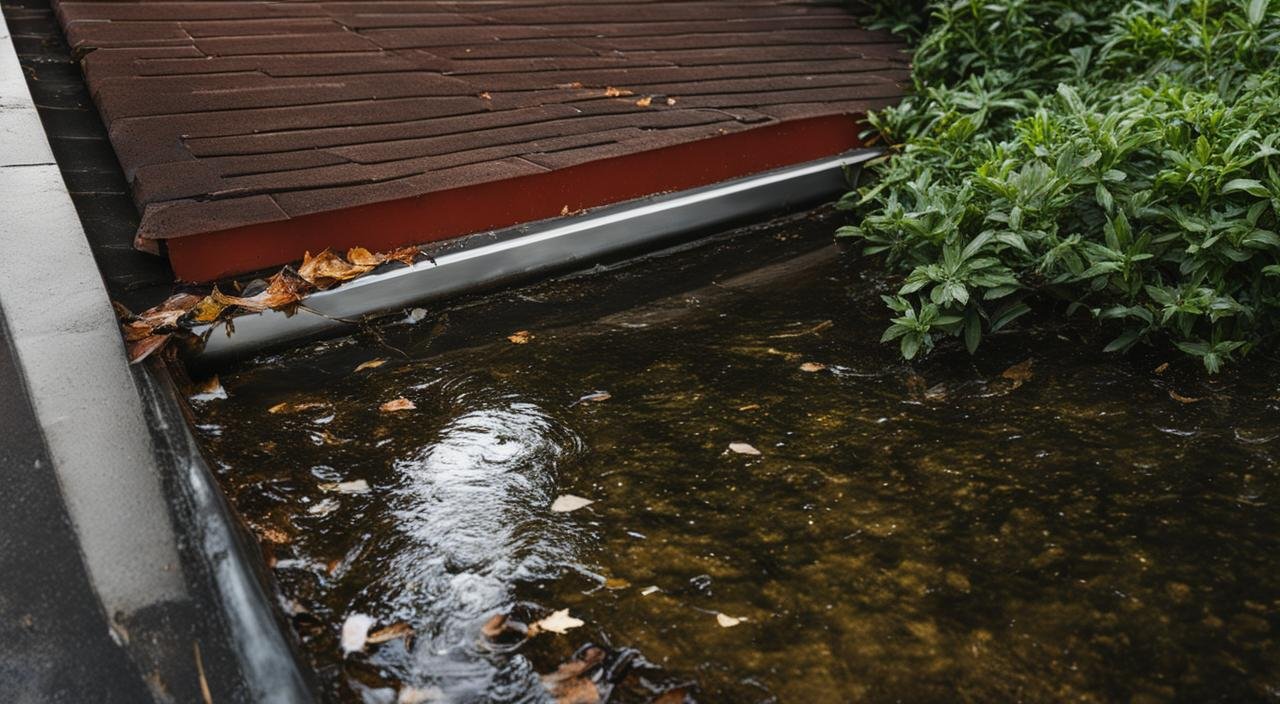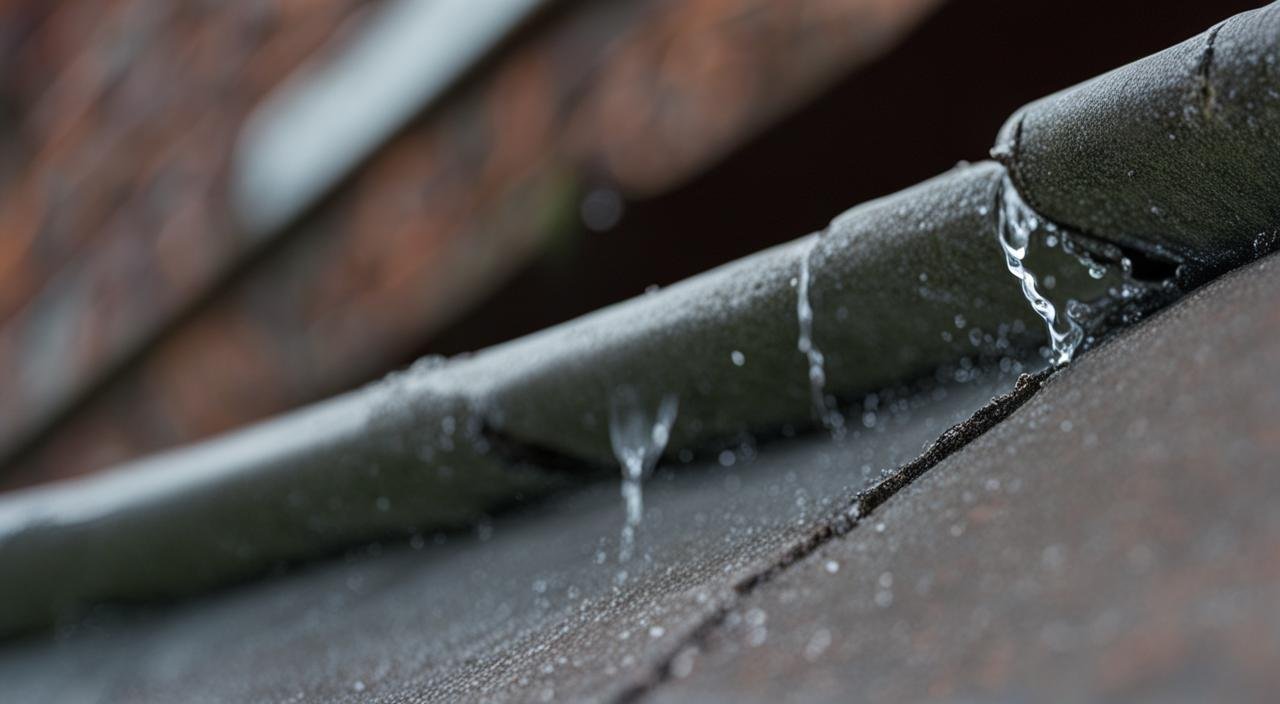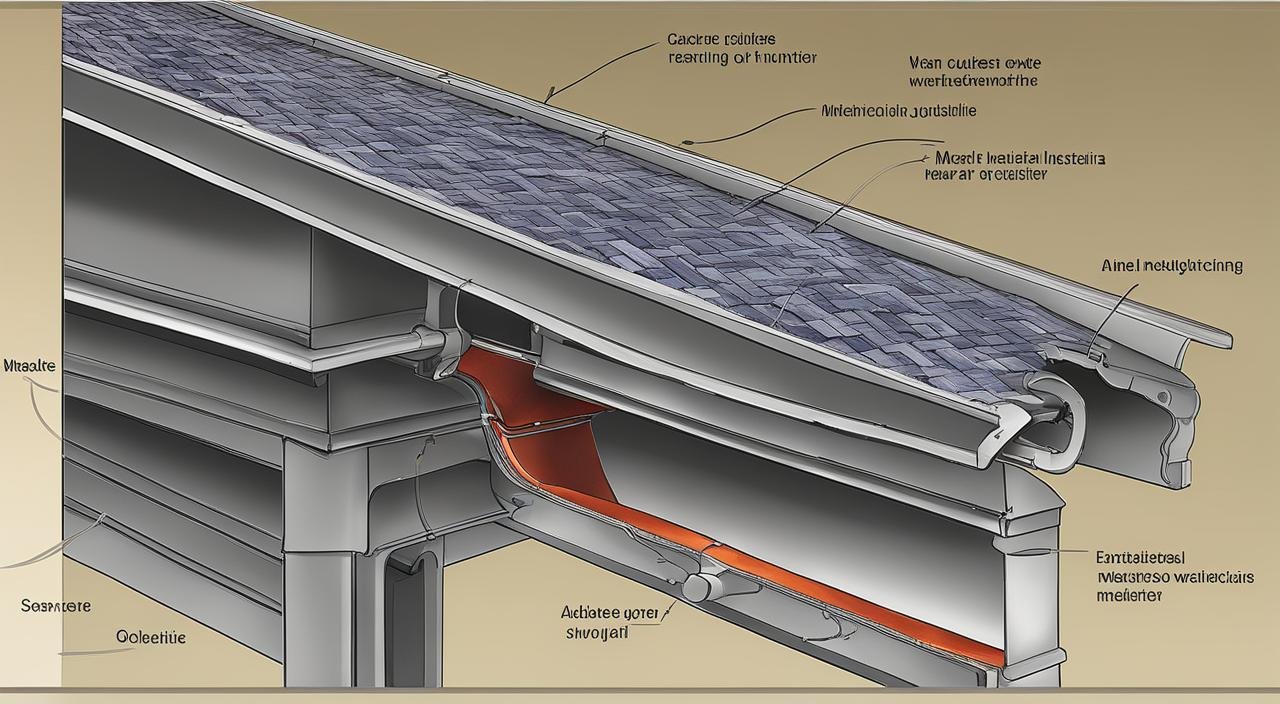As a homeowner, you understand the critical role that gutters play in protecting your home from water damage. When functioning correctly, gutters collect and redirect rainwater away from your roof and foundation, preventing costly repairs and structural damage. However, when gutters begin to leak, they can cause significant problems.
Gutter leakage is a common issue that can occur for various reasons. By understanding the causes of gutter leaks, you can take preventive measures and address any underlying issues promptly.
In this section, we will explore the reasons why guttering can leak and the common causes of this problem.
Key Takeaways
- Gutter leakage is a common and costly problem for homeowners.
- Understanding the underlying causes of gutter leaks is crucial to prevent further damage.
- Preventive measures can be taken to prolong the lifespan of your gutter system and avoid leaks.
- DIY repairs can save you money and time but seeking professional help may be necessary in some cases.
- Regular maintenance is essential to keep your gutter system clean and functional.
Common Causes of Gutter Leaks
If your gutter is leaking, chances are it’s due to one of several common factors. Understanding these causes can help you pinpoint the issue and implement the right solution for fixing your guttering system. Here are some of the most frequent culprits behind gutter leaks:
1. Debris Accumulation
A buildup of leaves, twigs, and other debris in your gutter can obstruct proper water flow and weigh your gutter down. Over time, this can cause cracks or holes to form, leading to leaks. Regular cleaning and maintenance can help prevent this problem.
2. Improper Installation
If your guttering system wasn’t installed correctly, it may be prone to leaks. For example, if the gutter is not properly sloped to allow water to flow toward the downspout, water may pool in certain areas, leading to leaks. Hiring a professional to install or repair your guttering can help ensure proper installation.
3. Rust and Corrosion
Gutters are typically made of metal, which can corrode over time due to exposure to the elements. This can cause rust and weakening of the metal, leading to leaks. Regular maintenance, including painting and rust-proofing, can help prevent this problem.
4. Weather Damage
Extreme weather conditions, such as heavy rain, hail, or wind, can damage your guttering system and lead to leaks. Inspecting your gutters after severe weather events and repairing any damage promptly can help prevent leaks from worsening.
5. Age and Wear and Tear
Just like any other component of your home, gutters can wear down and deteriorate over time. This can lead to cracks, holes and leaks. Regular maintenance and inspections can help you identify and address signs of wear and tear before they become bigger issues.
“While common causes of gutter leaks can be frustrating, the good news is that by taking preventative measures and addressing issues early, you can avoid more significant problems and extend the lifespan of your guttering system.”
Signs of a Leaking Gutter
Do you suspect that your gutter is leaking, but you are not sure? Here are the most common signs that indicate your gutter system may be compromised:
- Water stains on walls or ceilings: If you notice water stains on your walls or ceilings, it may indicate that water is seeping through your gutter system and into your home.
- Peeling paint or rust: Water damage can cause your gutter system to rust or peel. These visual cues are not only frustrating to achieve homeowners, but they are also an indicator of a potential leak.
- Pooling water or overflow: If you spot pools of water or overflow around your home’s foundation, it is likely that your gutter system is not channeling water away from your home effectively.
- Gutter cracks or holes: Visible cracks or holes in your gutter system are a clear sign that your gutter is compromised and should be fixed.
If you notice any of these signs, it’s important to address the issue promptly. Ignoring a leaking gutter can lead to costly repairs down the line.

How to Prevent Gutter Leakage
To avoid gutter leaks, it’s important to perform regular maintenance on your gutter system. Here are some tips to help prevent gutter leakage:
- Clean your gutters regularly: Debris such as leaves, twigs, and dirt can accumulate in your gutters and clog them up, causing water to overflow and seep into your home. Make sure to clean your gutters at least twice a year, or more if you live in an area with heavy foliage.
- Trim overhanging tree branches: Branches that hang over your roof can drop leaves and other debris into your gutters, leading to clogs and leaks. Trim overhanging branches to prevent this from happening.
- Check your gutter slope: Your gutters should slope slightly towards the downspout to ensure proper water flow. If your gutters are not sloping correctly, water can accumulate and cause leaks. Check the slope of your gutters and adjust them if necessary.
- Install gutter guards: Gutter guards can prevent debris from entering your gutters, reducing the risk of clogs and leaks. There are many types of gutter guards available, so choose the one that best suits your needs.
- Maintain your roof: A damaged or poorly maintained roof can lead to leaks that can damage your gutter system. Make sure to inspect your roof regularly and address any issues promptly.
By following these tips and performing regular maintenance on your gutter system, you can prevent leaks and prolong the life of your gutters. Remember, a well-maintained gutter system is essential to protect your home from water damage.
Fixing a Leaking Gutter: DIY Repairs
If you notice your guttering system is leaking, don’t panic! Some leaks can be fixed easily with DIY repairs. Here are some simple steps to follow:
- First, make sure to wear the appropriate safety gear, including gloves and eye protection. Safety should always come first when working on any DIY project.
- Inspect your gutter and downspout for any visible damage, such as cracks or holes. Use a ladder to get a closer look.
- If you spot any small leaks or holes, seal them with a gutter sealant. You can find this at any home improvement store and it’s easy to apply with a caulking gun.
- If the problem is caused by clogged gutters, clean them out using a gutter scoop or trowel. You can also use a pressure washer to blast away any debris or leaves.
- Check that your gutter is properly sloped towards the downspout. If it’s not, water will accumulate and cause leaks. Adjust the slope if necessary.
- Ensure your gutter is securely attached to your home. Loose fasteners can cause leaks.
- If your gutter is leaking in multiple places or you’re not comfortable with DIY repairs, it may be time to call in a professional.
Remember, regular maintenance can help prevent gutter leaks from occurring in the first place. Don’t neglect to inspect and clean your gutters at least twice a year to avoid any potential problems.
Troubleshooting Gutter Leakage
If you’re experiencing gutter leakage, identifying the cause can be challenging. Here are some troubleshooting tips to help you locate the source of the problem:
- Inspect the gutter system: Check for any visible damage, such as cracks, holes, or rusted areas. Look for signs of clogs, such as water overflowing from the gutter. Note any areas where the gutter is pulling away from the house.
- Check the downspouts: Ensure that the downspouts are clear of debris and allow water to flow freely. If the downspouts are blocked, water can accumulate in the gutter and cause leakage.
- Assess the slope: The gutter should have a slight slope towards the downspout. If the gutter is not sloping properly, water can accumulate and cause leakage.
- Check for improper installation: If the gutter system was not installed correctly, it can lead to leakage. Look for any areas where the gutter is not secured properly or where the seams are not sealed.
- Consider external factors: External factors such as tree branches, high winds, and harsh weather can damage gutters and cause leakage. Inspect the gutter system after severe weather conditions and trim any overhanging branches near the gutter.
By troubleshooting the problem, you can identify the underlying cause of the gutter leakage and take the necessary steps to fix the issue.

Remember, it’s essential to address gutter leakage promptly to prevent water damage to your home. If you’re unsure about how to fix the issue, don’t hesitate to seek professional help.
Gutter Maintenance Tips
Maintaining your gutter system is essential to prevent leakage and keep your home safe from water damage. Here are some useful tips for gutter maintenance:
- Regular cleaning: Debris, including leaves, twigs, and dirt, can accumulate in your gutter, clogging the system and causing leaks. Make sure to clean your gutters at least twice a year, ideally in the spring and fall.
- Inspect for damage: Regularly check your gutter for any signs of damage, including cracks, rust, and holes. Addressing damaged areas promptly can prevent larger issues from occurring.
- Trim overhanging branches: Trees that are too close to your roof can drop leaves and twigs into your gutter, causing blockages and leaks. Trim overhanging branches to prevent this from happening.
- Install gutter guards: Gutter guards can help prevent clogging by blocking debris from entering your gutter system. Consider installing guards to make your gutter cleaning tasks easier.
- Check your downspouts: Ensure that your downspouts are properly connected to your gutter system and are directing water away from your home’s foundation.
By following these gutter maintenance tips, you can help extend the lifespan of your gutter system and prevent costly water damage to your home.
Common Guttering Problems
If you notice issues with your guttering system, it’s important to address them promptly to avoid water damage to your home. Here are some common guttering problems to look out for:
Sagging Gutters
Sagging gutters occur when the hangers or brackets that attach the gutter to your roof begin to fail or loosen. This can cause water to overflow or leak, leading to water damage to your home’s exterior. To fix sagging gutters, you may need to replace the hangers or brackets or reinforce them with new screws or nails.
Clogged Gutters
Clogged gutters can be a result of debris accumulation, such as leaves, twigs, and dirt. When gutters are clogged, water cannot flow freely, which can lead to overflow and potential damage to your home’s foundation. You can maintain your gutters by regularly removing debris and installing gutter guards or screens.
Damaged Downspouts
Downspouts are responsible for carrying water away from your home’s foundation. When damaged or improperly installed, downspouts can cause water to overflow and damage your home’s exterior. To prevent this, ensure your downspouts are properly installed and free of damage. You can also install extensions to direct water further away from your home’s foundation.
Leaking Joints
Leaking joints occur when the connections between the gutter segments become loose or damaged. This can cause water to leak from the joints, leading to water damage to your home’s exterior. To fix this issue, you may need to replace the damaged joint or reseal it with caulk.
Icy Gutters
In colder climates, gutters can become filled with ice, which can cause them to pull away from your home’s roofline or sag. This can lead to water damage to your home’s exterior and roof. You can prevent icy gutters by installing heating elements or by removing snow and ice from your gutters regularly.
How to Fix Gutter Leaks: Professional Help
If DIY repairs have not resolved your gutter leakage problem, it may be time to seek professional help. An experienced gutter repair specialist can diagnose the issue and offer effective solutions to prevent further damage to your home.
Why Choose Professional Gutter Repair Services?
While DIY repairs may seem like a cost-effective option, they can often lead to more harm than good. Incorrectly installed gutters or poorly executed repairs can exacerbate the problem and cause more significant damage to your property.
Professional gutter repair services have the necessary expertise and tools to identify and address the root cause of the leak. By hiring a professional, you can ensure that the repair work is done correctly and effectively, preventing further damage.
How to Find a Reliable Gutter Repair Specialist
When looking for a gutter repair specialist, it’s essential to do your research and choose a reputable company with a proven track record. Here are some tips:
- Ask for referrals from friends, neighbors, or family members who have recently had their gutters repaired.
- Check online reviews and ratings on reputable websites like Angie’s List or Yelp.
- Verify the company’s license and insurance to ensure they are qualified and covered in case of accidents or damages.
- Ask for a written estimate that outlines the scope of work, materials used, and cost breakdown.
The Cost of Professional Gutter Repairs
The cost of professional gutter repair services can vary depending on the extent of the damage and the repair work required. Most companies offer free estimates, allowing you to compare prices and choose the best option for your budget.
While the cost of professional gutter repairs may be higher than DIY solutions, it’s essential to prioritize the health and safety of your home. Addressing gutter leaks promptly can prevent more costly repairs down the line and protect your property from water damage.
“Addressing gutter leaks promptly can prevent more costly repairs down the line and protect your property from water damage.”
Conclusion
Congratulations! You now understand the common causes of gutter leaks, how to identify the signs of a leaking gutter, and effective strategies for preventing gutter leakage. By following our maintenance tips and DIY repair instructions, you can keep your gutter system functional and extend its lifespan.
Why it Matters
A leaking gutter may seem like a minor annoyance in the grand scheme of things, but it can have serious consequences if left unaddressed. Water damage can compromise the structural integrity of your home, leading to costly repairs and even health hazards like mold growth.
By taking proactive measures to prevent gutter leakage and promptly addressing any issues that arise, you can protect your investment and ensure the safety and comfort of your family.
Your Next Steps
If you have noticed any signs of a leaking gutter, such as water stains on your exterior walls or soil erosion around your home’s foundation, it’s important to act fast. Use our troubleshooting tips to identify the cause of the leak, and if DIY repairs are not sufficient, consider hiring a professional gutter repair specialist.
But don’t stop there! To keep your gutter system in tip-top shape, make sure to perform regular maintenance tasks like cleaning out debris and checking for damage. With a little effort and care, you can enjoy a leak-free and stress-free home for years to come.

